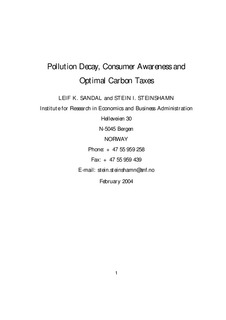| dc.contributor.author | Sandal, Leif Kristoffer | |
| dc.contributor.author | Steinshamn, Stein Ivar | |
| dc.date.accessioned | 2006-07-13T07:23:52Z | |
| dc.date.available | 2006-07-13T07:23:52Z | |
| dc.date.issued | 2004-02 | |
| dc.identifier.issn | 1500-4066 | |
| dc.identifier.uri | http://hdl.handle.net/11250/164065 | |
| dc.description.abstract | The effects of non-linear decay and consumer preferences are analyzed in a setting where optimal extraction of non-renewable resources is combined with stock externalities. The control is exercised via a corrective tax and the time horizon is divided into two periods: an initial phase with extraction and a terminal phase without extraction. The time horizon with extraction is determined endogenously. The model does not assume separability of the objective function. Sensitivity results indicate large differences in the optimal extraction period, the total level of extraction and cumulative emissions depending on the form of the decay function and the presence of consumers’ awareness for the environment. | en |
| dc.format.extent | 176411 bytes | |
| dc.format.mimetype | application/pdf | |
| dc.language.iso | eng | en |
| dc.publisher | Norwegian School of Economics and Business Administration. Department of Finance and Management Science | en |
| dc.relation.ispartofseries | Discussion paper | en |
| dc.relation.ispartofseries | 2004:7 | en |
| dc.subject | global warming | en |
| dc.subject | fossil fuel extraction | en |
| dc.subject | dynamic optimisation | en |
| dc.title | Pollution decay, consumer awareness and optimal carbon taxes | en |
| dc.type | Working paper | en |
